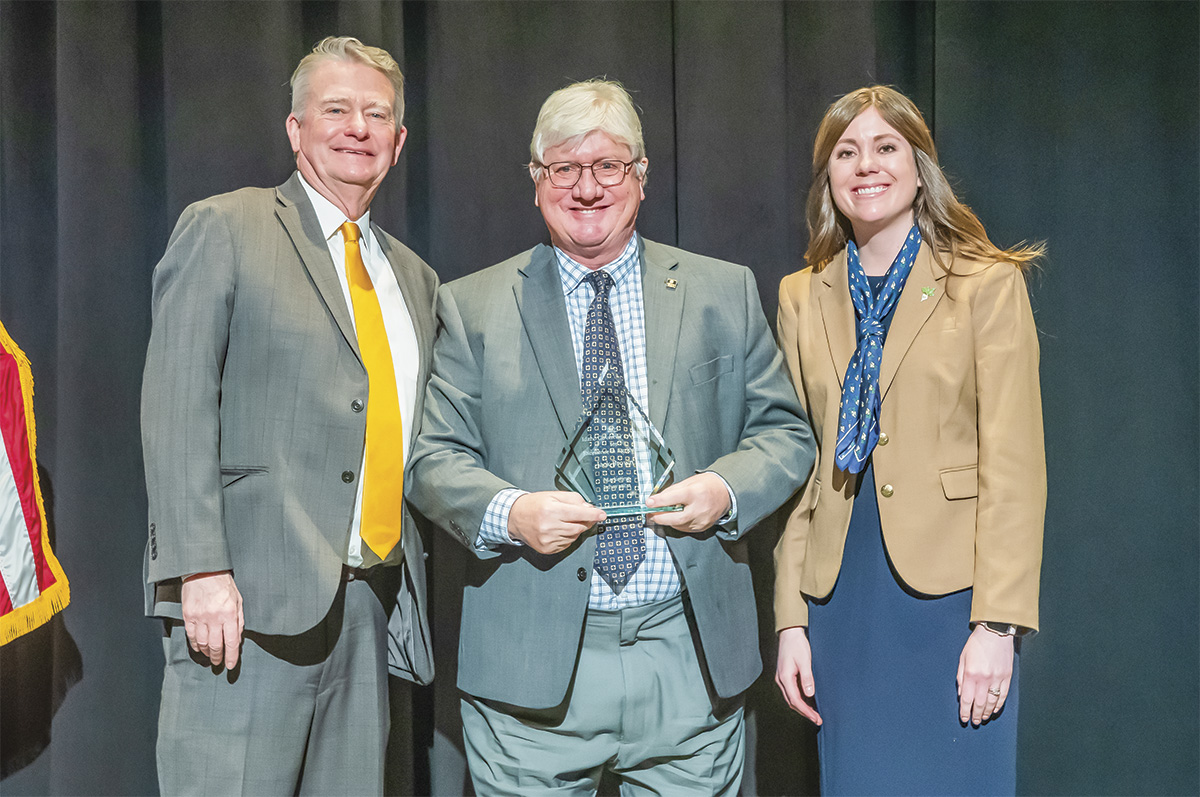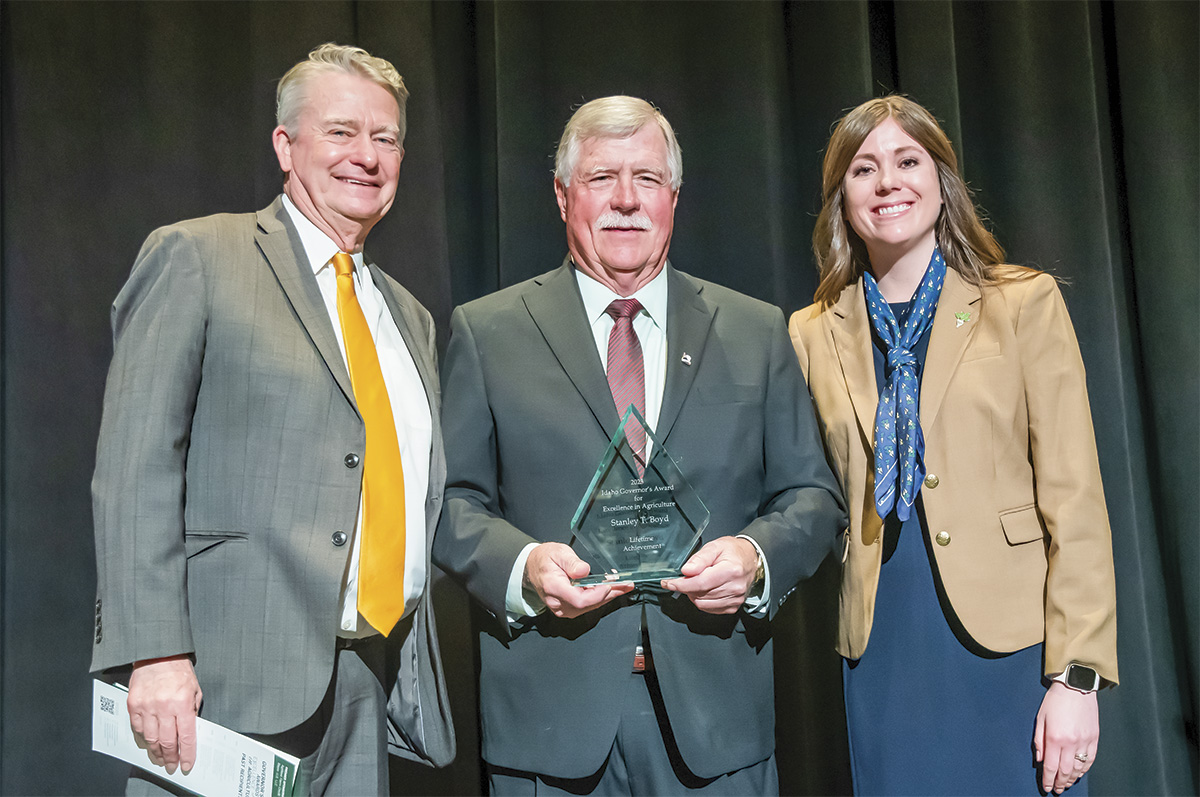This post was originally published on this site
Article Source: Five Idahoans recognized with Governor's Awards for Excellence in Agriculture - Ag Proud
As part of the annual Larry Branen Idaho Ag Summit, Idaho’s governor recognizes individuals and organizations who have made outstanding contributions to the Idaho agricultural industry. The following individuals were recognized during the event in Boise on Feb. 20.
Cordell and Jamie Kress
Education/Advocacy: Cordell “Cory” and Jamie Kress own and operate a dryland farm in the Rockland Valley of Power County. Cory earned a degree in engineering from the University of Idaho and worked for several years in the food processing division of Simplot before returning to Rockland to farm in 2004.
Jamie attended LDS Business College, where she studied business management and accounting. The family operation currently includes a crop rotation of winter wheat, safflower, mustard, dry peas and canola. Both Cory and Jamie are actively involved in several boards and organizations, working with their leadership groups to make an impact that is meaningful to agriculture in Idaho.
Cory has served on the Idaho Oilseed Commission and currently holds a seat on the Idaho Wheat Commission. Jamie recently completed her role as president of Idaho Grain Producers Association (IGPA), serving as the first woman president in the organization’s history.
Cory and Jamie are both natural connectors – they know the importance of relationships in agriculture, at both the state and national level, and they work hard to build strong, poignant, sensible affiliations. Cory has led a successful charge to increase collaboration between the University of Idaho (U of I) and Utah State University (USU) on research projects that benefit Idaho growers. His efforts earned him a spot on USU faculty selection committees, helping shape the next generation of research in the region.
While serving on National Association of Wheat Growers (NAWG), as chair of the Domestic and Trade Policy Committee, Jamie helped the committee identify opportunities to not only educate lawmakers on issues of importance to wheat production but also to be a strong advocate for policy that has real on-farm implications. Cory and Jamie’s children, Tyson and Hailey, are also involved in the farm operation.
Cory and Jamie are constantly asking the question “What else can we be doing?” to help promote and sustain agriculture in Idaho, and they follow through on ideas. They encourage involvement in various groups that will make an impact for farmers now and into the future.
Lance Griff
Environmental Stewardship: Lance Griff grew up on the family farm started by his grandfather, Eugene, in the 1940s. After graduating from Filer High School, he went to U of I to pursue a degree in ag, science and technology. Upon graduation, Lance returned to the farm to put his new knowledge and passion for agriculture to work.
Lance works full time as a partner in Griff Farms, where he farms with his father and business partner, Ron. Together, they farm 3,800 acres of wheat, beans, corn and alfalfa out on the Salmon Tract south of Twin Falls. When Lance joined the family farming operation, it was already known for being one of the pioneers in the area for converting from gravity flow irrigation to sprinkler irrigation with pivots. Ten years after Lance began farming full time, he sought a better way to utilize scarce water resources in the area and increase irrigation efficiency. One potential solution he identified was no-till farming and the use of cover crops.
In 2013, Lance began experimenting with cover crops to try to improve overall soil health and water efficiency. As Lance closely monitored the effects of no-till land cover crops over the next several years, he began to see extremely positive results. Crop residue on the soil surface prevented wind and water erosion and allowed water to penetrate much better, thus using less water as well as reducing the chance for fertilizer to run off the field to contaminate other water sources. The use of cover crops has also led to less fuel use through the growing season. Fewer passes in the field equates to fewer carbon emissions in the atmosphere, reduced labor cost and less wear and tear on expensive equipment.
Lance has been recognized by several organizations for his innovative farming practices, including Soil Health Champion award by the National Association of Conservation Districts in 2017. In 2020, Lance was featured by the U of I and the NRCS in a video showing how he was planting corn into wheat stubble and the positive results from that. Lance and his wife have adopted three children. Their family was selected as a Food Producers of Idaho Featured Farm Family at the Twin Falls County Fair in 2016. Lance thinks outside the box with an eye toward long-term sustainability, efficiency and profitability on the farm. He truly is a leader in innovation around soil health.

Jack Brown receives his award from Gov. Brad Little and Samantha Parrott, executive director of the Snake River Sugarbeet Association. Photo by Brad Elsberg, Elsberg Studios.
Jack Brown
Marketing Innovation: Dr. Jack Brown has been involved in developing superior genetic varieties of industrial, edible and condiment mustard and canola for a wide range of environments throughout the Pacific Northwest (PNW) and the world for more than 28 years. In his tenure as a plant breeder, geneticist, professor and department head of the brassica breeding and research program in the plant sciences at U of I, Brown has worked hard to build up the reputation of the little-known, underappreciated canola plant.
He was instrumental in developing many new varieties of canola, mustard and rapeseed. Under Brown’s direction, the U of I has played a key role in developing new uses and values of canola, rapeseed and mustard plants. Spring canola was just beginning to have a commercial presence in Idaho and the Pacific Northwest when Brown began at the university, and the varieties available at the time were inadequate. Brown introduced the concept of planting canola early, foraging the crop for livestock and then harvesting the seed. Canola yields have increased at least twofold in the nearly three decades Brown worked on the plants.
His canola breeding efforts have produced several cultivars that have been widely grown in the PNW, including “Amanda” winter canola, a non-GMO variety that currently occupies a large proportion of acreage in the PNW and does well at overcoming challenges such as winterhardiness, vigor and yield stability. Brown has always been a passionate teacher where he shared his love of agronomy. His energy and wit attracted students into plant sciences, and he also used those talents with producers. Brown always said he most enjoyed working with the growers and felt the Pacific Northwest farmers are the most progressive, intelligent and most open-minded group of farmers he has ever met. Brown leaves a legacy with the program as canola acreage is on the rise in Idaho, Montana, Oregon and Washington. His efforts in the greenhouse, field and classroom in the Pacific Northwest, U.S. and around the world have impacted Idaho agriculture.

Gov. Brad Little and Samantha Parrott, executive director of the Snake RIver Sugarbeet Association, present Stan Boyd with his award. Photo by Brad Elsberg, Elsberg Studios.
Stanley T. Boyd
Lifetime Achievement: Stanley T. Boyd spent his childhood in Powder River, Oregon, on the family sheep ranch. His father, Tom Boyd, was an active sheepman, trading and selling lambs and wool across the West. Stan and his two brothers, Steve and Dave, were in charge of taking care of the animals and the farm early on while Dad was gone for days on business.
Stan graduated from Baker High School and attended Oregon State University, where he graduated with a Bachelor of Science in business administration and a Bachelor of Science in agricultural economics. In 1978, Stan was hired to become the executive director of the Idaho Wool Growers Association (IWGA). From that time forward, Stan devoted his life to Idaho agriculture.
While he was executive director of the IWGA, Stan also became the secretary of the Idaho State Predatory Board and secretary of the Idaho Sheep Commission. Within a few years, Stan began lobbying for the Idaho Cattle Association, the Idaho Horse Breeders Association, the Idaho Elk Breeders Association, Idaho Horse Racing Association, Bear World, Ridge Line Energy and many short-term lobbying contracts.
Stan loved his time spent in the Idaho State Capitol. Stan has a passion for all ag issues but especially for the sheep industry. As the general manager of the Rocky Mountain Sheep Marketing Association, Stan is responsible for marketing and shipping over 70,000 lambs in Idaho and the surrounding states.
Stan works closely with major lamb processors, brokering the best prices available and securing lucrative contracts for Idaho sheep producers. Stan continues to promote and market Idaho lamb through his restaurant, The Refuge Restaurant and Lounge, which exclusively sources all its lamb from Idaho.
Stan and his wife, Anne, have three children: Jake (deceased), Regan – a lawyer, and Sam – an accountant who also helps Stan with shipping lambs. Even after serving the Idaho sheep industry and Idaho agriculture for 38 years, Stan’s work is still not done. “Retirement” is a loose term for Stan, as he continues to be a lifelong advocate for all of Idaho agriculture.
—From an AMG Idaho press release
Idaho Grain Producers Association
“Our mission is to serve the grain producers of Idaho by representing their interests at the county, state and federal levels to enhance their profitability and long term viability.”
About IGPA
Representation
Send Us A Message
Contact Info
821 West State Street
Boise, Idaho 83702-5832
(208) 345-0706

